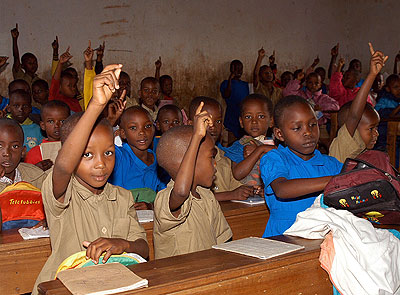Editor, I wish to react on the article, “Should Kinyarwanda be the language of instruction in schools”, published in the Society Magazine of The New Times on May 10.


Editor,
I wish to react on the article, "Should Kinyarwanda be the language of instruction in schools”, published in the Society Magazine of The New Times on May 10.
Language is not only a medium to preserve culture, tradition or religion. According to Russian and French structuralists, it is a secondary model of building systems of symbols which allow us to interpret reality.
Therefore language does not only define items and objects, but also creates an own reality, a semantic-historical world. Language is a house of living where living rooms, flours, kitchen and toilet are nothing else but expressions which give structure and orientation to our existence.
The first language is therefore a home for customs and habits which may be useful in the sense that we find ourselves at home. But at the same time, it also may be a basis for prejudices, followed by the persecution of minorities, genocides etc.
I strongly support your position. A child needs this very orientation to build up his world in order to find his convictions, to accept or to fight norms of conducts etc. The first language is not only an instrument, but also a child’s condition to define the world in a way that he is capable of defending his rights as a citizen. A person that is not able to join in a discussion has no rights at all.
Therefore, I plead for the use of Kinyarwanda as the language of instruction in primary schools under the condition that children are gradually motivated to switch to other languages that are taught in other schools.
As I already wrote in other contexts in The New Times, I strongly advocate for a trilingual system in Rwanda with Kinyarwanda as first language while both English and French can be used as secondary languages.
I really cannot understand why English is imposed as an only medium of instruction in Rwandan schools and universities.
After a tragedy such as the 1994 Genocide against the Tutsi, state and society have to do everything to reunite people who fortunately have already a common ground in the language used and understood by everybody.
Let me tell you finally that in post-war Western Germany, the German people tried to forget their own failure during the Third Reich under Hitler, when millions of people had been deported and killed in the gas chambers.
In the 1950s and 1960s we adapted to American customs, fashion and music trying to imitate the English, our master’s voice used to intonate. Only with the student’s revolt in the later 1960s we got aware that singing American songs such as "This is my land, this is your land” would not help us to overcome our national trauma.
Although we continued learning English and French we understood that our debate had to take place in our native language contaminated by the Nazi jargon taught in Hitler’s Germany.
New generations of Rwandan citizens can only find a humane and ethical orientation by engaging in debates in the language they are used to speak at home.
In a second step they should be able to transfer their experiences and deeper insights into other idioms in order to communicate with neigbouring countries and the world.
Kecke, Berlin, Germany


